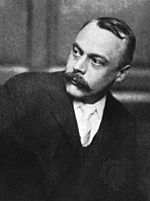No subscription or hidden extras
#life
Read through all quotes from Kenneth Grahame
Grahame married Elspeth Thomson in 1899; they had only one child a boy named Alastair (whose nickname was "Mouse") born blind in one eye and plagued by health problems throughout his short life. Toad one of its four principal characters. Kenneth loved the sea and was happy there but when he was 5 his mother died from complications of childbirth and his father who had a drinking problem gave over care of Kenneth his brother Willie his sister Helen and the new baby Roland to Granny Ingles the children's grandmother in Cookham Dean in the village of Cookham in Berkshire.
Kenneth Grahame (8 March 1859 – 6 July 1932) was a Scottish writer most famous for The Wind in the Willows (1908) one of the classics of children's literature.

